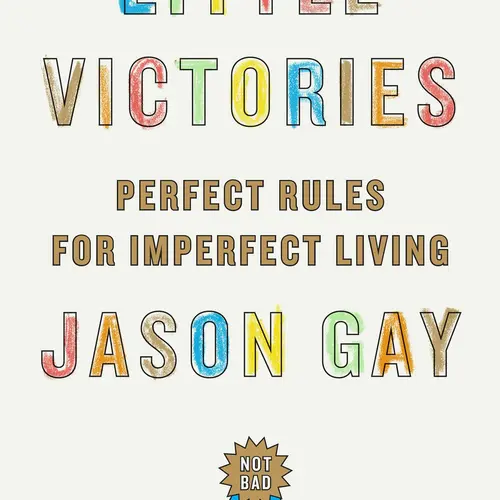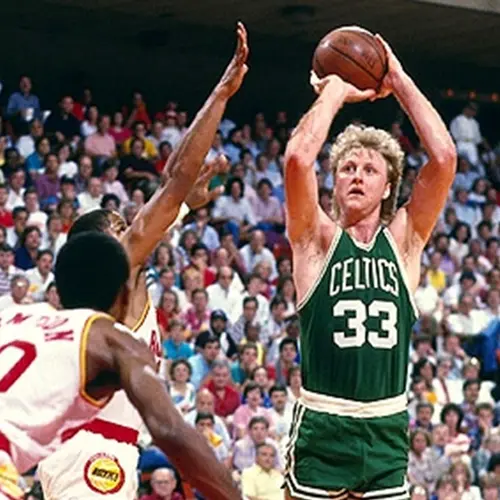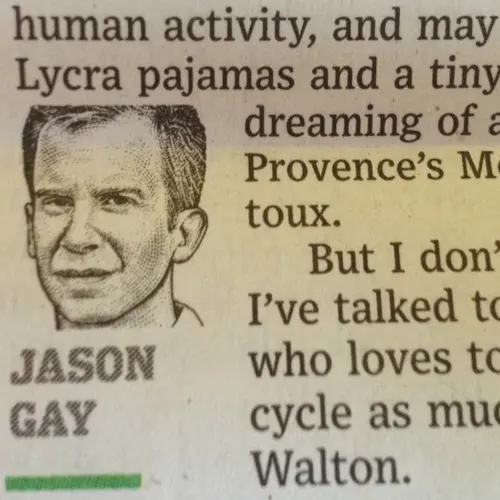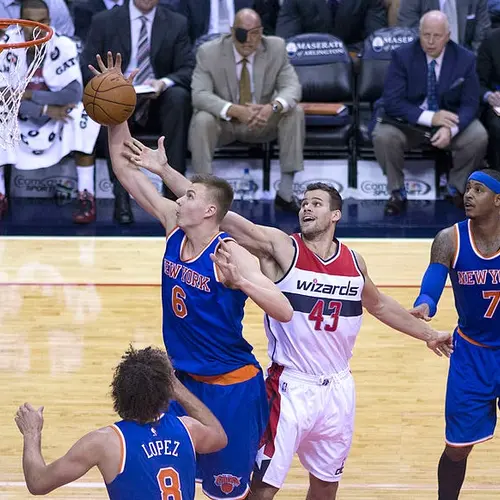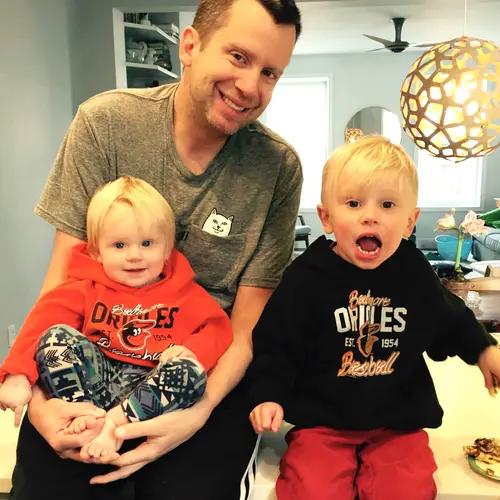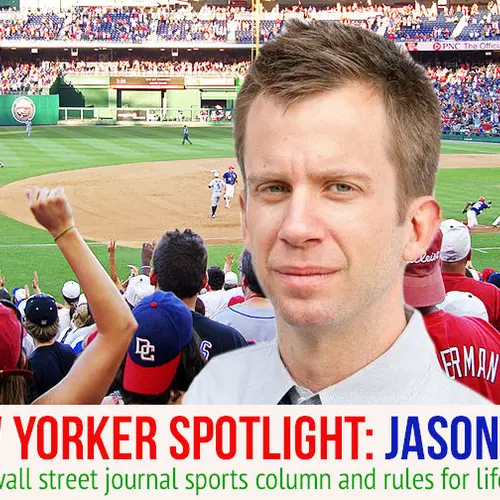Spotlight: The Wall Street Journal’s Jason Gay Talks Sports and Rules for Life in NYC
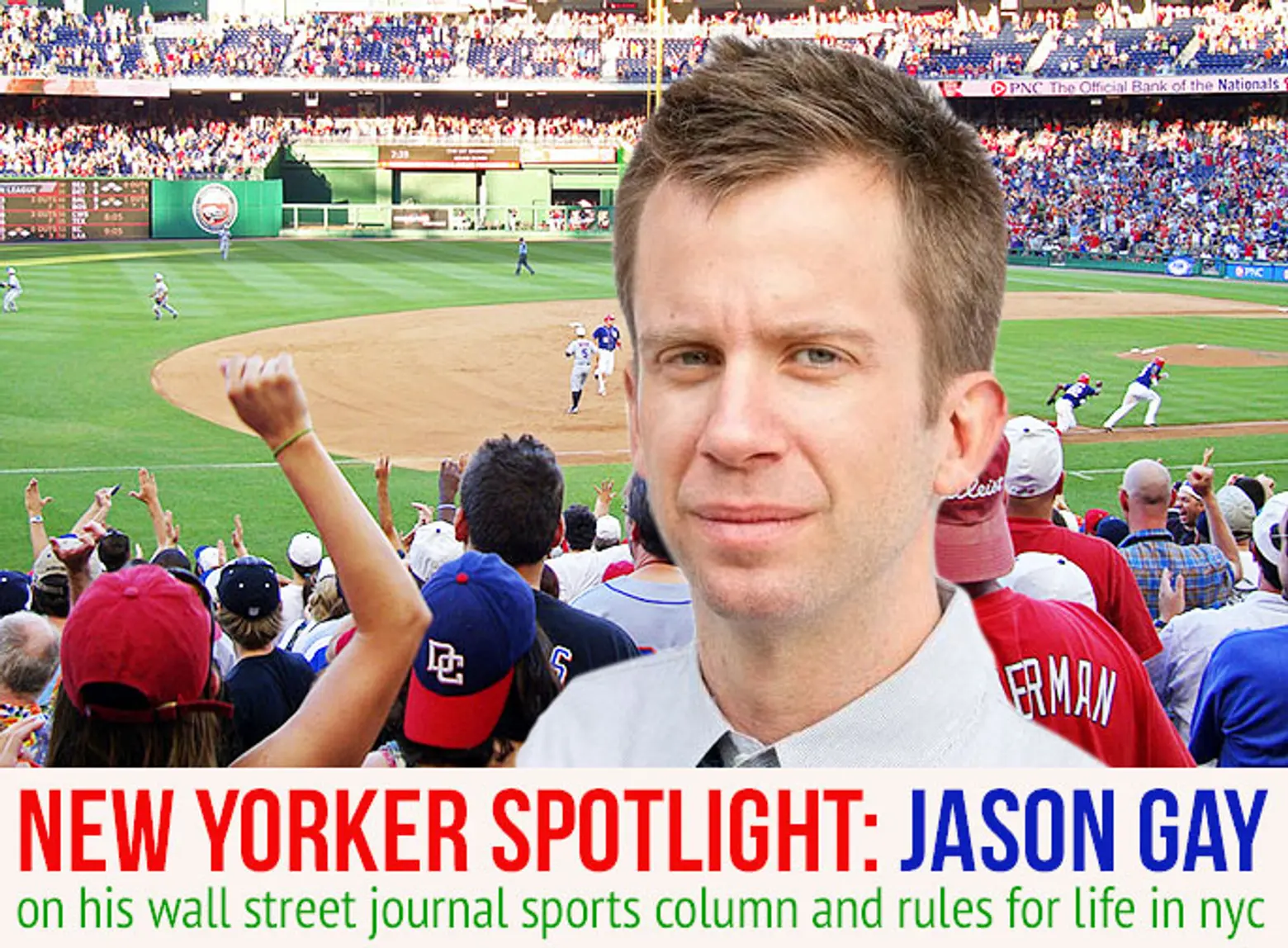
New Yorkers tend to have go-to writers who they read day in and day out — with their morning coffee, on the subway, or winding down after a long day. For many, Jason Gay is on this team of journalists. As a sports columnist for The Wall Street Journal, he regularly provides sports coverage, insights, and opinions for the paper’s readership. He writes extensively about specific players and teams, but also pens features that touch upon the human aspects and humor that can be found on and off the court.
Jason has become known for his funny rule-centric columns, including the very popular “The 32 Rules of Thanksgiving Touch Football” and “The 27 Rules of Conquering the Gym.” This passion for rules took shape as a book, “Little Victories: Perfect Rules for Imperfect Living,” which takes seemingly banal topics — parenthood, exercise, office life, travel, and the holidays — and celebrates how the smallest accomplishments in life are often the most meaningful.
6sqft recently spoke to Jason about sports, writing for the Journal, and how “Yankees World Championships are like real estate closings.”
 A vintage image of Larry Bird playing for the Celtics
A vintage image of Larry Bird playing for the Celtics
Growing up, what role did sports play in your life?
I grew up in the suburbs of Boston and my father was a high school tennis coach in Cambridge, which put me in a little bit of a sports environment. It was the ’80s with the heartbreak of the Red Sox in 1986, but also the great Celtics championships with Larry Bird. Boston has always been a big, rabid, excitable sports town, so it was pretty hard to not have that make an impression. I’m not saying loving sports is mandatory for living in Boston, but it certainly helps. I did soccer, basketball and baseball and of course tennis with my dad, who would never let me win.
I was never an impressive athlete of any kind, but I liked it still, and in junior high school I started doing sports writing about the basketball team. When I got to high school I continued doing that kind of stuff. The Boston Globe’s sports section was and still is regarded as one of the better ones in the country. It was pretty hard to not read that and have it make a strong impression. In the same way that people want to be doctors or rocket scientists, I thought sports and writing sounded like such a great combination and that it would be a dream job.
How did you take this interest in sports writing and turn it into a career?
I began writing about sports in my first job, literally covering Little League baseball as a kid fresh out of college. Along the way when I went to different publications and magazines and newspapers, I would occasionally do sports writing, even if I was writing about politics at the time or something else. So this Journal thing kind of happened as a fluke. They were developing a sports section, but it really didn’t have a dedicated page until very recently. They were looking for someone, and I was one of the people they called, and lucky is the only way to describe it. Right place, right time and I’ve been thrilled to be there.
What is it like to write for The Wall Street Journal?
If I had known what it means to write for The Journal when I started, I probably would have fainted and never have been able to type a word. The first few times I wrote for them, I was just trying to make myself laugh and not thinking too hard about the audience because I knew if I did, I’d freak out. It’s a global audience, it’s a smart audience, they’re really engaged, and they let you know when they like something and when they don’t. I love it. I’ve been working in newspapers for a long time, and I’ve never had the audience relationship that I’ve had with Journal readers so it’s a real privilege.
The WSJ is known for its sketched headshots. Was was the experience like of having yours done?
I wish it was like the scene with Leonardo DiCaprio and Kate Winslet in the Titanic, but it was nothing like that. They asked for a photograph, so my friend Pete took a very nice one and I sent that in to the geniuses who do the sketches. They’re called a hedcut, and they’re so distinct to The Journal. It really is the thing that people ask you the most about because it’s been there as long as people have been reading the paper. What people like to do is contrast what they see in the hedcut to real life. I happen to think my hedcut is considerably more handsome than I am in real life, so I’m just disappointing people.
You talked about how big of a sports town Boston is, but now you live in New York, another huge sports town that has big rivalries with Boston. How have these two locations shaped your thinking on sports?
I’ve been gone from Boston long enough and they’ve won so many championships since I left that the town is almost unrecognizable to me in terms of this jubilance about sports. When I grew up, the Celtics won, but basically no one else did, and they broke your heart and created a personality of the suffering fan. Obviously the tables have turned in Boston.
New York, on the other hand, I feel is the town of great scale, ambition, expectation and success. So you contrast let’s say the historic success of the Yankees or the New York Giants against underperformers like our fabulous Knicks or Jets, and there’s always some saga happening somewhere. We have more professional sports teams in the greater New York area than in any other place in America, so there’s always going to be some crazy thing happening, which, for somebody in my position, is perfect.
As a sports columnist, are you still able to be a fan?
I try to always be that way. I don’t mean to say I can’t think critically about what I write, which I think is part of my job, but I don’t want to lose sight of the fact that these are games that people go to because they make them happy. It’s not like going to a Board of Health meeting or a Senate meeting. It means sometimes buying a ticket on your own and sitting there and having the fan experience and not getting isolated from it in the world of press boxes. Which is not to say that people in the press box don’t enjoy these things as much, but I think it’s a useful experience for anybody who is in the world of professional sports to have that fan experience. I think the idea of complete impartiality in sports is fading because people realize that it’s somewhat illogical. We all bring our own opinions and fandoms and upbringings and biases to these things, and I think the safer thing to do is just be completely honest about them, and that’s what I try to do.
Since you travel frequently, you get to see a lot of fans in action. Do you think New Yorkers are a different type of sports fan than those from other parts of the country?
I think the in-game experience in New York caters very largely to a corporate ticket buyer, sort of a professional, after-work audience. When you go to the Knicks or the Yankees, you look down at those fancy seats and a lot of people look like they just walked out of their 4:00pm meeting. And often times, those seats aren’t full or people are leaving early, which leaves a feeling of a little disconnection. But you go to other cities where tickets are more affordable, and you might see more families, more friends, more outings, that kind of stuff. I think that’s something New York needs to turn an eye to. You see a little bit of it at the Mets, where it feels like more of a family experience. At a lot of those playoff games last year, you didn’t get the feeling that all the corporate suits had moved in. They just were hardcore Mets fans; that’s what it should be.
You frequently write rule-oriented columns. Why do rules interest you?
There’s something that’s just catnip-like about a list of rules. I enjoy reading things like “10 ways to slim down for summer” or “20 ways to stay on a budget.” You’re sort of inclined to read rules, so I started working on these humorous rules for sports. Whether it was a Thanksgiving family touch football game, the Fourth of July whiffle ball game, or an office holiday party, I was treating them not seriously at all and basically having fun with the concept of advice. And for whatever reason, people responded to them. The great thing about stories like the Thanksgiving touch football game is that people send in pictures and the score, so it took on a minor life of its own.
Last Fall your book “Little Victories” was published. What was the experience like writing it?
I wanted to write a book I knew I could finish, and I wanted to do something that I knew I could take from A to Z. This was expanding the concept of rules from sports to everything – relationships, family, children, travel, office life. I broadened the stuff I write about in the column and applied the same silly look at the culture of advice.
Keeping in lines with rules, what is one rule New Yorkers should incorporate into their lives?
Never go to LaGuardia Airport. I cannot avoid it, so I don’t practice what I preach, but I was just there the other day and there’s this funny thing at Laguardia where you get off a plane or sometimes you’re going onto a plane, you’re walking down this little corridor area, and it looks like it’s abandoned and you wonder, “Have I just walked out of the airport accidentally and into some haunted house?”And yet it’s still Laguardia Airport.
Do you think there are any similarities between sports and New York real estate?
I’ve said this in the past, but I do believe that the New York Yankees – the most decorated professional sports franchise in America – enter virtually every season expecting to compete or win a title. When they win a title, it’s not the kind of eruption that you see in a place like Kansas City or Boston in 2004, or what it would be like for the Chicago Cubs to win. It’s more of an auspicious moment where they’re just doing what they’re supposed to do. So I feel like Yankees World Championships are like real estate closings. You’re just sitting there and the lawyers look over and say, “Okay, we’re going to do this? Alright, we’ll do this.” And you shrug your shoulders and walk out and shake everybody’s hand. It doesn’t have the type of bonafide shock and electricity you have in other places.
Another thing is if you go out to dinner with a group of friends and [bring up a topic], 50 percent of the table loves to talk about it and 50 perfect hates it. It shares that in common with sports. We probably talk about sports and real estate at dinners and barbecues more than anything else, and we probably should pay attention to other things.
What has covering sports taught you?
It’s taught me two things that I feel strongly about now. One is that sports mean a great many things to different people. Some people have an emotional connection to a team that they grew up with – loving, appreciating. They might be the person who paints their face green and sits in the top bleachers at a Jets game, or they might be somebody who can only watch 20 minutes of a basketball game during a week because they’re so busy. They have a young family and it’s really hard to stay connected to, but they still care.
That leads to the second thing, which is that I feel there’s an underserved sports audience. A great chunk of sports coverage these days is dedicated to an obsessive, somebody who has to have every last statistical detail. It’s not to say those details aren’t incredibly interesting, but I just don’t think they’re for everybody. There’s a whole sector of the audience who wants to read something a little more relatable.
+++
[This interview has been edited]
RELATED:
- Spotlight: Author Gay Talese Reflects on More Than Sixty Years in the NYC Journalism World
- New Yorker Spotlight: Guy Zoda – a.k.a. King Henry – Entertains Brooklyn Cyclones Fans
- New Yorker Spotlight: CurlNYC Has Brought Curling to New York and They Want You to Try It
Lead image background via Guzman and Harris Head Home to Tie It Up via photopin (license); Headshot via WSJ





